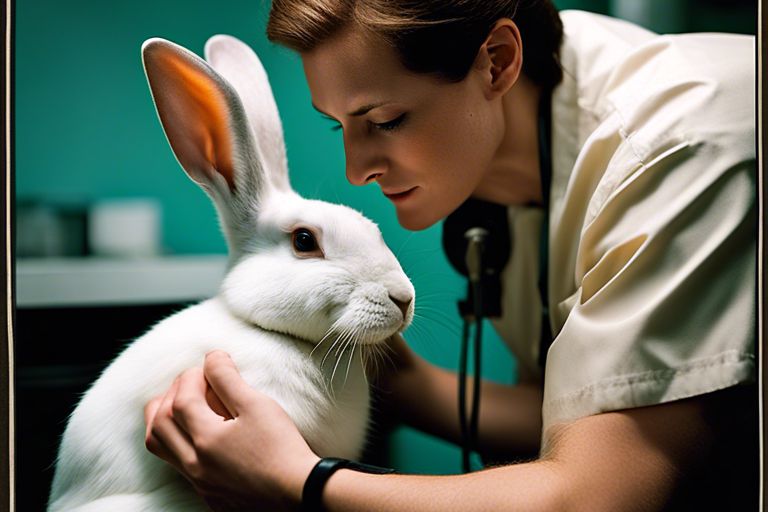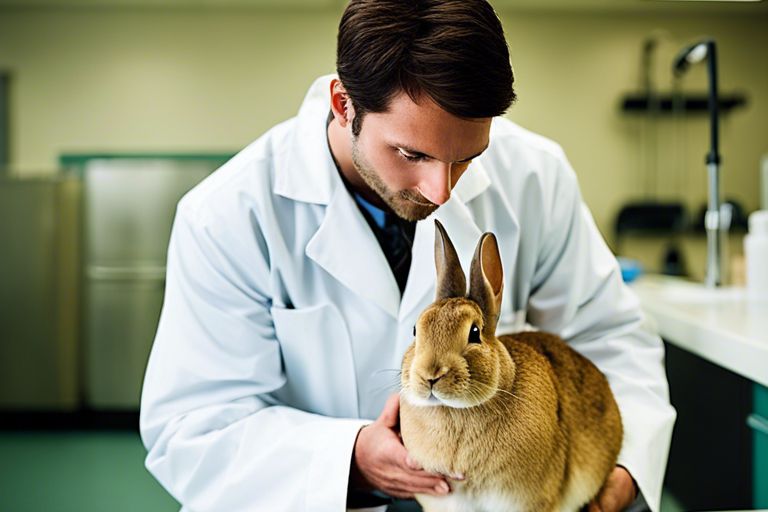Evidently, if you own a Flemish Giant rabbit, you are likely aware of the potential health issues that can arise in these beloved pets. One particularly concerning problem that can affect these gentle giants is nose breathing difficulties. It is crucial that you are able to recognize the signs of this condition and understand how to address it in order to ensure the well-being and comfort of your rabbit. In this blog post, we will explore the potential causes of nose breathing difficulties in Flemish Giant rabbits, discuss the symptoms to look out for, and offer guidance on how to seek treatment and provide relief for your furry friend. Your rabbit’s health is of utmost importance, and by staying informed, you can become a proactive and responsible caretaker for your beloved pet.
Key Takeaways:
- Observation is key: Pay close attention to your Flemish Giant Rabbit’s breathing patterns and any signs of nasal discharge.
- Consult a veterinarian: If you suspect your rabbit is experiencing nose breathing difficulties, seek professional help from a qualified veterinarian.
- Symptoms to watch for: Look for signs such as wheezing, sniffling, sneezing, and labored breathing that may indicate respiratory issues.
- Proper cage hygiene: Keep your rabbit’s living space clean and free from dust, mold, and other potential allergens that could contribute to breathing problems.
- Monitor environment: Ensure your rabbit’s environment is well-ventilated and free from cigarette smoke, strong odors, and other irritants that could affect their breathing.
Identifying Nose Breathing Difficulties
Clearly, it’s important to be able to identify if your Flemish Giant rabbit is suffering from nose breathing difficulties. Rabbits are obligate nasal breathers, which means that they rely solely on nasal breathing to meet their oxygen needs. Any obstruction or difficulty in nasal breathing can be life-threatening for these pets. Here’s how you can identify if your rabbit is experiencing nose breathing difficulties.
Common Symptoms
If your Flemish Giant rabbit is experiencing nose breathing difficulties, you may notice increased breathing efforts or rapid, shallow breathing. There may also be excessive nasal discharge as well as sneezing or sniffling. Additionally, your rabbit may become less active or have a decreased appetite. If you observe any of these symptoms in your rabbit, it’s important to take them seriously and seek veterinary care.
When to Seek Veterinary Care
It’s crucial to understand when to seek veterinary care for your Flemish Giant rabbit if you suspect they are experiencing nose breathing difficulties. If you notice any of the common symptoms mentioned earlier, or if you simply have a gut feeling that something is not right with your rabbit’s breathing, it’s imperative to seek veterinary care as soon as possible. Delaying treatment could lead to worsening of the condition and pose a serious threat to your rabbit’s health and well-being.
Causes of Nasal Breathing Issues
Some breed-related health conditions can contribute to nasal breathing issues in Flemish Giant rabbits. These can include genetic predisposition to respiratory problems that affect the structure of your rabbit’s nasal passages or airways.
Environmental Factors
Environmental factors such as dust, pollen, smoke, and other irritants can also cause nasal breathing difficulties in your Flemish Giant rabbit. Improper ventilation in your rabbit’s living space can exacerbate these issues, leading to discomfort and potential health problems. Keeping your rabbit’s living area clean and dust-free can help alleviate these environmental factors. Ensure that your rabbit’s living space is well-ventilated and free of potential respiratory irritants. Assume that poor ventilation or exposure to smoke or dust may be contributing to your rabbit’s nasal breathing difficulties.
Underlying Health Conditions
In some cases, nasal breathing difficulties in Flemish Giant rabbits can be attributed to underlying health conditions such as respiratory infections or dental problems. Respiratory infections can cause inflammation and congestion in your rabbit’s nasal passages, leading to difficulties with breathing. Additionally, dental issues such as overgrown teeth can affect the alignment of your rabbit’s jaw and nasal passages, contributing to breathing problems. If you suspect that your rabbit may be experiencing nasal breathing difficulties due to an underlying health condition, it is important to seek veterinary care as soon as possible to address the issue.
Prevention and Care
After identifying some potential causes of nose breathing difficulties in Flemish Giant rabbits, it’s essential to take steps to prevent and care for your rabbit to ensure their long-term health and well-being. Here are some important factors to consider when it comes to preventing and caring for your rabbit’s nose breathing difficulties.
Habitat Maintenance
One of the most crucial aspects of preventing nose breathing difficulties in your Flemish Giant rabbit is maintaining a clean and healthy habitat. Ensure that you regularly clean your rabbit’s living area, removing any soiled bedding, droppings, and spilled food. A clean environment can help reduce the risk of respiratory issues and keep your rabbit healthy.
Diet and Nutrition
Another important factor in preventing nose breathing difficulties in your Flemish Giant rabbit is providing them with a proper diet and nutrition. Make sure to offer a balanced diet that includes hay, fresh vegetables, and a small amount of commercial rabbit pellets. Additionally, ensure that your rabbit has access to clean, fresh water at all times. A healthy diet can help support your rabbit’s overall health and immune system, reducing the risk of respiratory problems.
Treatment Options
Unlike other rabbit breeds, Flemish Giant rabbits may require special attention and care when it comes to nose breathing difficulties. The treatment options for addressing these issues can vary, ranging from home remedies and care to professional medical interventions. It’s important to consider the severity of the breathing difficulties and consult with a veterinarian to determine the best course of action for your Flemish Giant rabbit.
Home Remedies and Care
If your Flemish Giant rabbit is experiencing nose breathing difficulties, there are a few home remedies and care measures that you can take to alleviate their symptoms. Firstly, ensure that your rabbit’s living environment is clean and free from dust and other irritants that could exacerbate their breathing issues. You can also use a humidifier to help keep the air moist, which can be particularly beneficial if your rabbit is experiencing nasal congestion. Additionally, providing your rabbit with a diet rich in hay and leafy greens can help support their respiratory health. However, it’s important to note that while these measures may provide some relief, they may not fully address the underlying cause of your rabbit’s breathing difficulties.
Professional Medical Interventions
If your Flemish Giant rabbit’s nose breathing difficulties persist or worsen, it may be necessary to seek professional medical interventions. A veterinarian who is experienced in treating rabbits can provide a thorough examination to determine the cause of your rabbit’s respiratory issues. Depending on the diagnosis, treatment options may include medication to reduce inflammation, antibiotics to treat infections, or even surgeries to correct structural abnormalities that are impacting your rabbit’s ability to breathe comfortably. It’s imperative to seek prompt veterinary care if you notice any concerning symptoms or changes in your rabbit’s breathing patterns.

Is Your Flemish Giant Rabbit Suffering From Nose Breathing Difficulties?
Following this guide, you should now have a better understanding of the potential causes and symptoms of nose breathing difficulties in your Flemish Giant rabbit. It is important to monitor your rabbit closely for any signs of respiratory distress and seek veterinary assistance if necessary. By being proactive and observant, you can ensure that your rabbit receives the proper care and treatment to alleviate their breathing difficulties and improve their overall quality of life. Remember, your rabbit’s health and well-being should always be a top priority.
FAQ
Q: What are the symptoms of nose breathing difficulties in Flemish Giant rabbits?
A: Symptoms of nose breathing difficulties in Flemish Giant rabbits may include wheezing, noisy breathing, nasal discharge, and decreased activity due to a lack of oxygen. It’s crucial to seek veterinary attention if you notice any of these signs in your rabbit.
Q: What are the common causes of nose breathing difficulties in Flemish Giant rabbits?
A: Common causes of nose breathing difficulties in Flemish Giant rabbits include respiratory infections, dental problems, allergies, and nasal obstructions. These issues can lead to breathing difficulties and should be promptly addressed by a veterinarian to ensure the rabbit’s well-being.
Q: How can I help my Flemish Giant rabbit with nose breathing difficulties?
A: If your Flemish Giant rabbit is experiencing nose breathing difficulties, it’s essential to seek veterinary care immediately. The vet will conduct a thorough examination to diagnose the underlying cause and prescribe appropriate treatment. In some cases, this may include medication, dental work, or environmental changes to alleviate allergens. Providing a clean and dust-free environment along with proper nutrition can also help support your rabbit’s respiratory health.
